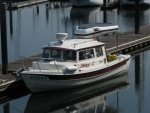RobMcClain
Member
- Joined
- May 21, 2012
- Messages
- 357
- Reaction score
- 0
- C Dory Year
- 2006
- C Dory Model
- 23 Venture
- Vessel Name
- Freedom
We have a Raymarine 54 VHF radio on our boat that has DSC capability but never had an MMSI entered (fortunately for us). I intend to get an MMSI, but before I do I would like some opinions regarding the need to go through the FTC. I know I can get the MMSI from Boat US or SeaTow, but their numbers are not for use outside U.S. waters. If we might venture into Canadian waters it sounds like I need to get the MMSI directly from the FTC by applying for both a Ship's Station License and a Restricted Radiotelephone Operator Permit. It is my understanding that only with these can I legally operate the VHF while in Canadian waters.
I suspect almost all of our cruising will be done in US waters, both costal and lakes. Most of our costal cruising will be in CA, but we really do want to venture up to OR and WA. In fact, we hope to make the La Conner gathering if health and our calendar allows. We also hope to cruise the San Juans at some point in the next year or two, but right now that is just on our wish list. Also on our wish list is to cruise into Victoria harbor and/or Vancouver. Will we ever do it - who knows - but we're retired and it's on out list.
Based on our wish list I should apply accordingly through the FTC for the necessary license(s) and MMSI. Of course, there are 2 sets of forms and fees associated with their process, while the Boat US process is painless and free. Processing time is not really an issue for us right now.
I am curious what those of you in the Pacific Northwest have done. Is the FTC issued MMSI the best way to go? Is this something that is checked by Customs or anyone else? I like the idea of being legal and having the added safety it sounds like the FTC issued MMSI might possibly provide in the case of an emergency, but I can't help but wonder if it is worth it.
I'd appreciate a hearing what those of you up north have found... Thanks!
Rob
I suspect almost all of our cruising will be done in US waters, both costal and lakes. Most of our costal cruising will be in CA, but we really do want to venture up to OR and WA. In fact, we hope to make the La Conner gathering if health and our calendar allows. We also hope to cruise the San Juans at some point in the next year or two, but right now that is just on our wish list. Also on our wish list is to cruise into Victoria harbor and/or Vancouver. Will we ever do it - who knows - but we're retired and it's on out list.
Based on our wish list I should apply accordingly through the FTC for the necessary license(s) and MMSI. Of course, there are 2 sets of forms and fees associated with their process, while the Boat US process is painless and free. Processing time is not really an issue for us right now.
I am curious what those of you in the Pacific Northwest have done. Is the FTC issued MMSI the best way to go? Is this something that is checked by Customs or anyone else? I like the idea of being legal and having the added safety it sounds like the FTC issued MMSI might possibly provide in the case of an emergency, but I can't help but wonder if it is worth it.
I'd appreciate a hearing what those of you up north have found... Thanks!
Rob

